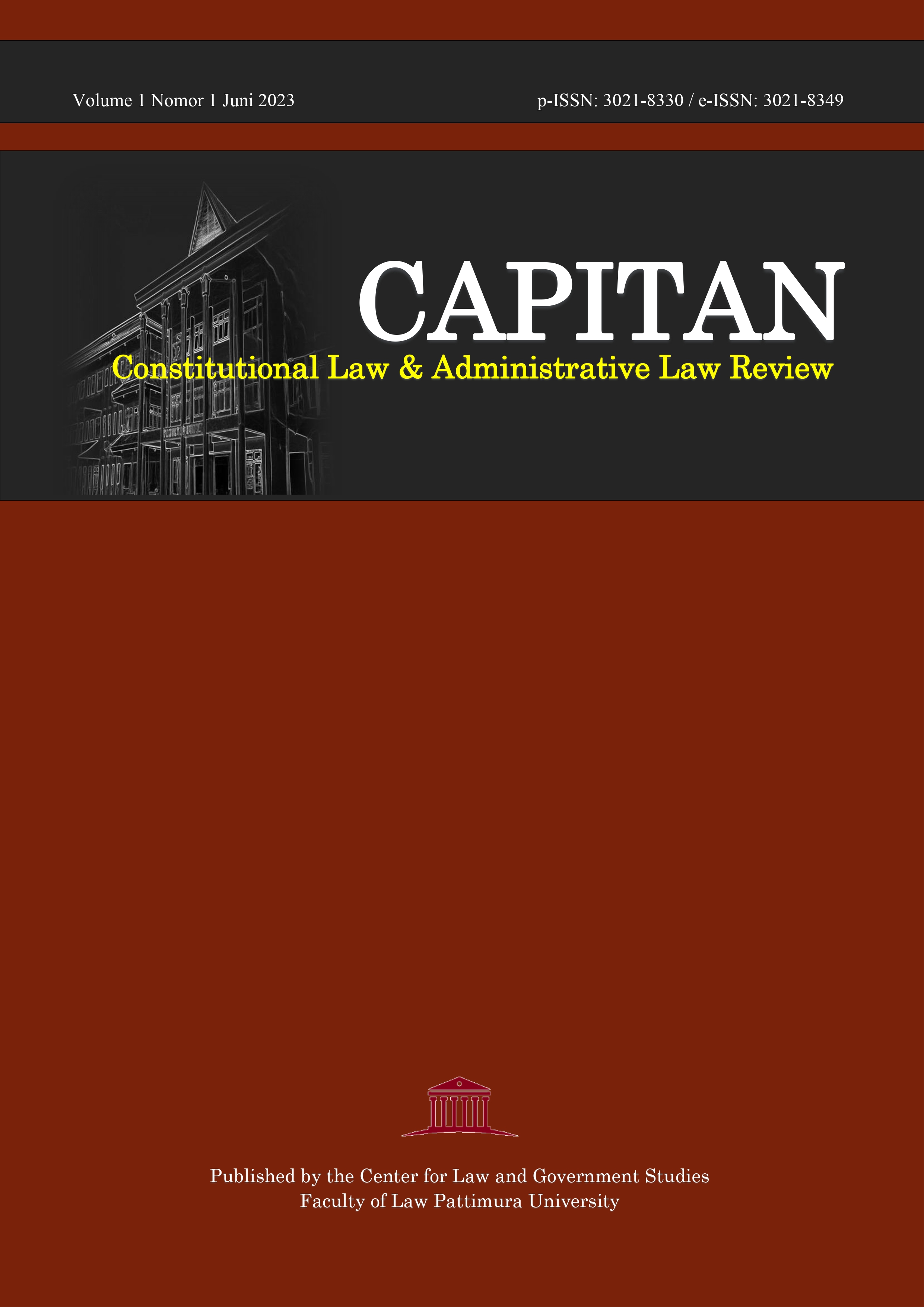Pemekaran Daerah dan Otonomi Daerah Kerangka Hubungan Pusat Daerah
Abstract
Regional autonomy as the government's choice in the administration of regional government to assist efficient and effective regional governments in managing governance. The desantralization pattern distributes authority to the regions within territorial limits. The fundamental organization enables the governing policies of a system. A policy itself in the whole system of government. The pattern of power and financial relations between the central government and regional governments is largely determined by the national political configuration at a given time. This article was written using the method of conceptual thinking with critical legal studies as the type of research. The result of this article is that the formation of new regions must be aimed at improving public services, accelerating the realization of community welfare, and also channeling political education at the local level. There is also a need for an evaluation of regional expansion with indicators of the objectives of the expansion. The urgency of evaluation is so that the desire and rapid division of regions does not make local governments paradoxical with goals. it is necessary to implement it as a corrective action so that the positive implications of corrective action can be felt more properly, it must have a legal basis by the provider of regional autonomy, namely the central government.
Downloads
References
Jurnal
Amelia Martira dan Harsanto Nursadi, “Hubungan Keuangan Pemerintah Pusat Dan Daerah Dalam Penyelenggaraan Jaminan Kesehatan Nasional”. Jurnal Hukum dan Pembangunan, Vol. 50 No, 1, (2020).
Pugu, Melyana R. Pro Dan Kontra Isu Pemekaran Papua Suatu Kajian Hubungan Internasional. Journal of Syntax Literate, Volume 7 Nomor 4. (2022).
Tiebout, C. M. A pure theory of local expenditures. Journal of political economy, Volume 64 Nomor 5, (1956).
Buku
Bagir Manan, Menyongsong Fajar Otonomi Daerah, (Yogyakarta: Pustaka Pelajar, 2002).
HAW Wijaya, 2005, Penyelenggaraan Otonomi di Indonesia “Dalam Rangka Sosialisasi UU No.32 Tahun 2004 tentang Pemekaran Daerah”, Jakarta: Raja Grafindo Persada, 2005).
Hestu Cipto Handoyo, Otonomi Daerah Titik Berat Otonomi dan Urusan Rumah Tangga Daerah “Pokok-Pokok Pikiran Menuju Reformasi Hukum di Bidang Pemerintahan Daerah”, (Yogyakarta: Universitas Atma Jaya, 1998).
Indra Ismawan, 2002, Ranjau-Ranjau Otonomi Daerah, (Solo: Pondok Edukasi, 2002).
M Nur Sholikin, Awasi Perda, Berdayakan Daerah Seri Panduan Pemantauan Legislasi Daerah, Jakarta: Pusat Studi Hukum dan Kebijakan Indonesia, 2009)
Muhammad fauzan, Hukum Pemerintahan Daerah, (Yogyakarta: UII Press, 2006).
Murtir Jeddawi, Pro Kontra Pemekaran Daerah (Analisis Empiris), (Yogyakarta: Total Media, 2009)
Ni’matul Huda, Otonomi Daerah Filosofi, Sejarah Perkembangannya dan Problematika, (Yogyakarta: Pustaka Pelajar, 2005).
Ni’matulm Huda, Hukum Pemekaran Daerah, (Bandung: Nusa Media, 2009)
Nordholt, Henk Schulte. "Decentralisation in Indonesia: Less state, more democracy?." Politicising democracy: The new local politics of democratization, (2005).
Siswanto Sunarno, Hukum Pemerintah Daerah di Indonesia, (Jakarta: Sinar Grafika, Jakarta, 2008).
Tarigan, Antonius. "Dampak Pemekaran Wilayah." Majalah Perencanaan Pembangunan 1 (2010).
Copyright (c) 2023 Winanda Kusuma, Sieska Afriana Sintasari

This work is licensed under a Creative Commons Attribution-NonCommercial 4.0 International License.
Authors who publish their manuscripts in this Journal agree to the following conditions:
- The copyright in each article belongs to the author, as well as the right to patent.
- Authors are able to enter into separate, additional contractual arrangements for the non-exclusive distribution of the journal's published version of the work (e.g., post it to an institutional repository or publish it in a book), with an acknowledgment of its initial publication in this journal.
- Authors are permitted and encouraged to post their work online (e.g., in institutional repositories or on their website) prior to and during the submission process, as it can lead to productive exchanges, as well as earlier and greater citation of published work.
- Authors have the right to self-archiving of the article (Author Self-Archiving Policy)













